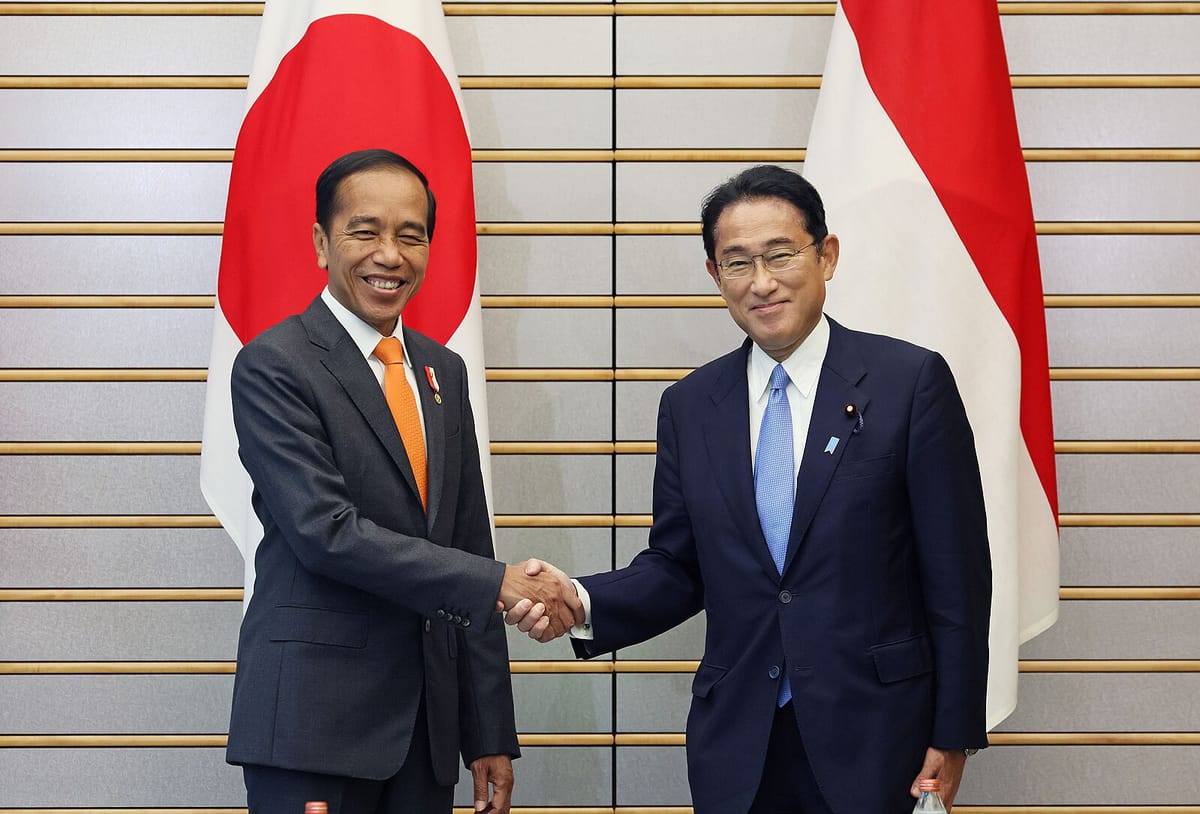Japan Hosts ASEAN Summit with Focus on South China Sea

The Lede: Over the weekend, Japan hosted the ASEAN-Japan Commemorative Summit in Tokyo from Saturday to Monday in an effort to strengthen ties with member countries in Southeast Asia against the backdrop of geopolitical friction with China.
What We Know:
- The summit marked the 50th anniversary of ASEAN-Japan friendship and cooperation. It was co-chaired by Japanese Prime Minister Fumio Kishida and Indonesian President Joko Widodo and produced a joint statement as well as an implementation plan under three main cooperation pillars: regional peace and stability, people-to-people exchanges, and the co-creation of a future economy and society. The last pillar refers to securing supply chains, sustainability, digitization and renewable energies.
- On Saturday, Japan and Malaysia signed a security assistance deal, which included a grant of $2.8 million from Tokyo to assist with maritime security. Kishida also offered a grant of $63.7 million to Indonesia for the same purpose. Kishida met separately with the leaders of all the ASEAN members including Cambodia, Singapore, Thailand, Laos, and Timor-Leste.
The Background: Japan’s engagement with ASEAN has traditionally been a vehicle to support development in the region, partly as a result of its actions in the Second World War. However, Tokyo’s outreach has moved more toward addressing China’s assertiveness in recent years. Japan has already made deals with the Philippines and Bangladesh this year as part of a plan announced in April for Tokyo to give financial support to developing countries as a means of bolstering their defenses. Kishida spoke with Vietnam's President Vo Van Thuong on November 27 in Tokyo and Philippine President Ferdinand Marcos Jr. on November 3. On December 7, Japanese Ambassador Atsushi Ueno met with Cambodia’s Prime Minister Hun Manet in Phnom Penh. Japan has had a long-standing territorial dispute with China over the Senkaku Islands, known in Chinese as the Diaoyu Islands, in the East China Sea.
Likely Outcomes:
- Japan’s aim in the region will be to keep the South China Sea free from dominant Chinese control in order to better manage security matters and ensure shipments of energy and other critical materials. It appears that Tokyo’s intention is not to aggressively challenge Beijing’s presence in an explicit way, but to stake a favorable position among the many countries that have interests in the region in the areas of cooperation discussed at the summit while preserving regional autonomy. However, Japan’s close association with Western countries—especially the U.S.—which have been building up military capabilities in a way that is seen by China as aggressive, coupled with the more recent focus on maritime security in the South China Sea, could make Japan’s ASEAN engagement appear to be a veiled military challenge.
- China’s response to this and other engagement in the region by its rivals will likely be greater involvement in the region, which has already been underway with high-level visits and integration into the Belt and Road Initiative (BRI). In September, the U.S. and China competed for influence at the ASEAN summit in Jakarta. The more significant rivalry is still with the U.S., but Japan remains a major consideration for China.
Quotables:
“We hope that relevant countries can truly do things conducive to regional peace and stability. At the same time, any cooperation should not target third parties.” – Mao Ning, Chinese foreign ministry spokeswoman
"Japan regards China's regional hegemonic ambitions as a grave threat to its security and has actively worked to upgrade security partnerships to contain China in line with the U.S.-backed free and open Indo-Pacific." – Jeff Kingston, professor of history and Asian studies at Temple University, Japan Campus
“Staying nonaligned contributes to compelling China and Japan to compete economically within Southeast Asia, itself a boon to local economies.” – Nate Fischler, Asia-Pacific analyst at RANE
“Japan will aim to empower ASEAN to maintain its regional autonomy so that it can resist pressures from external actors and retain a range of geopolitical choices.” – Kei Koga, associate professor at Nanyang Technological University
Good Reads:
Japan and ASEAN bolster ties at a summit focused on security and economy amid tensions with China (AP)
With eye on China, Japan and ASEAN to unveil ‘new vision’ for ties (Japan Times)
Analysts: Japan Strengthening ASEAN Security Ties to Contain China (VOA)
Japan, Malaysia Sign $2.8M Maritime Security Deal to Counter China (VOA)
Japan, Asean summit to advance ‘security cooperation’ amid growing South China Sea tension (SCMP)
